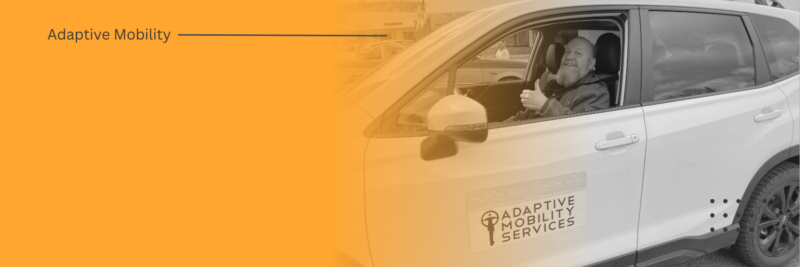
Driving & Mild Cognitive Impairment
Driving is a complex activity that requires various cognitive abilities, including memory, focus, and decision making. For individuals with mild cognitive impairment (MCI), these abilities may begin to diminish and create major concerts about their safety behind the wheel. Understanding how MCI impacts driving abilities is essential not only for the benefit of your loved one, but as well as for the safety of other drivers. A diagnosis of mild cognitive impairment can impact individuals in different ways. It is very helpful to work with an Occupational Therapy Driver Rehabilitation Specialist to ensure that the individual with MCI has fitness to drive.
Although mild cognitive impairment can be a precursor to dementia, it is important to note that not everyone with a MCI diagnosis will go on to develop dementia. If your loved one with MCI is later diagnosed with dementia, they will have to retire from driving.
Identifying Warning Signs
As cognitive function declines, various aspects of driving become increasingly challenging. Families and caregivers of individuals with mild cognitive impairment should be on the lookout for the following signs that may indicate a change in their driving ability due to MCI:
- Increased forgetfulness
- Getting lost driving in familiar areas
- Difficulty making timely decisions while driving
- Becomes easily confused
- Trouble following directions
- Minor accidents or near misses
If you see any of these signs in a loved one with mild cognitive impairment, it might be time to contact a driver rehabilitation specialist for a comprehensive driving evaluation.
Driver Rehabilitation Specialist Assessments
A driver rehabilitation specialist can perform a thorough evaluation of your loved one’s cognitive abilities related to driving, as well as any visual or physical limitations that may be present as a result of their MCI diagnosis. The comprehensive driving evaluation includes testing of vision, movement, reaction time, and thinking along with a behind-the-wheel evaluation. This on-road assessment allows for firsthand observation of an individual’s driving capabilities in varied circumstances. A driving evaluation provides insightful information for establishing a baseline of driving skills and helps an individual’s medical team and family in making informed decisions surrounding their loved ones driving.
Alternative Methods of Transportation
If it is decided that driving is no longer a safe transportation option for your loved one with mild cognitive impairment, it’s important to have a strong support team to help the individual. Leverage the objective observations of the OT driver rehabilitation specialist with guidance from the doctor to reinforce recommendations. Be open and honest in conversation with them about the situation. Highlight the importance of their safety, and focus less on their new limitations. During this conversation it can be helpful to discuss alternative modes of transportation once they retire from driving. Depending on the individual’s circumstances and abilities, the following may be viable options:
- Family & Friends
- Community Services
- Public Transportation
- Ride-share Services
An occupational therapist can help individuals and their families create transportation plans that fit the needs and abilities of the loved one with mild cognitive impairment. Retiring from driving can be challenging for your family and your loved one. By taking a proactive approach and working with an OT DRS and neurologist, you can ensure the safety of your loved one with mild cognitive impairment and other drivers.
Meet Susie!

Susie Touchinsky, OTR/L, SCDCM, CDRS, is an established expert in both occupational therapy and driver rehabilitation. She has been an OT for more than 20 years and brings expertise and a love for helping others in her speeches and trainings.
Learn More With Our OT Driver Rehabilitation Specialist Courses
Try Our Free OT DRS Courses:
- OTs Role With Driving
- GRID: Generalist Resource to Integrate Driving
- Readiness to Drive: IADL Checklist
- FREE 6 Driving Resources for the OT
- 5-Steps Our Clients Use to Start Their Own Highly-Paid OT Driver Rehab Business
- Driving Risk Screening Tools
- BCAT Brief Cognitive Assessment Test System Overview
- BCAT Part 2: CBS 8 & 15-for-Me
Become the best OT Driver Rehabilitation Specialist you can be by being a life long learner.
